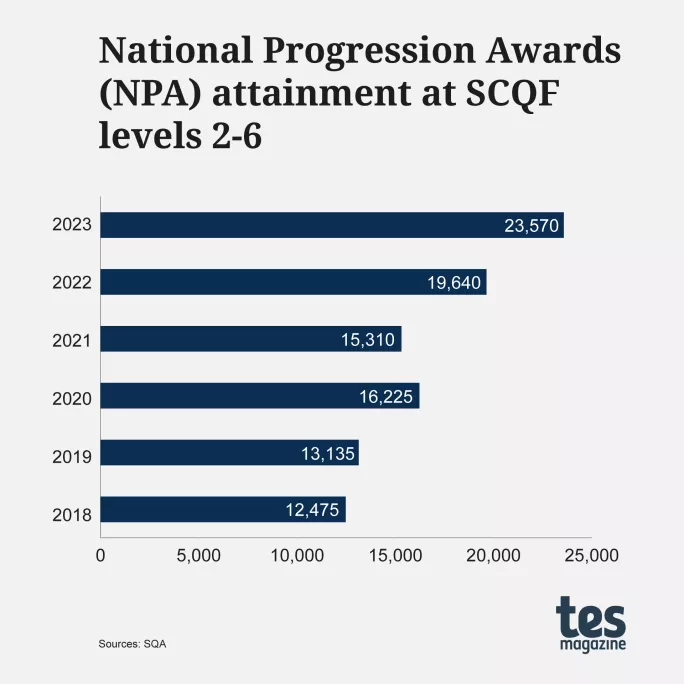The rapid growth of National Progression Awards (NPAs) is one of the standout trends in Scottish qualifications in recent years.
Yet while Scotland’s results days coverage yesterday focused largely on what was happening with better known qualifications such as National 5s and Highers, the remarkable rise of NPAs stayed largely under the radar.
In the past year alone, NPA attainment has risen by 20 per cent - and it has almost doubled since 2018.

In 2023 there were 23,570 NPA awards at Scottish Credit and Qualifications Framework (SCQF) levels 2-6 (level 6 is equivalent to a Higher and level 5 to a National 5), up from 19,640 in 2022 and 12,475 in 2018.
In that same 2018-2023 period, secondary schools throughout Scotland have been trying to broaden the range of “pathways” they offer students, so that everyone can leave school with a clutch of useful qualifications, wherever their skills and interests lie.
National Progression Awards: a massive range of subjects
While NPAs have often offered by colleges or with the help of colleges, many are now run entirely in-house by schools. This week’s SQA data shows 15,635 NPA awards attained through local authority schools in 2023 - three-and-a-half times the amount in 2019 (around 4,455).
The Scottish Qualifications Authority (SQA) says NPAs are “aimed at assessing a defined set of skills and knowledge in specialist vocational areas”, and that they “develop skills much sought after by employers” and “encourage learners to think differently and aim higher”.
NPAs cover a bewildering array of subjects: a random selection of 267 recorded in SQA data published yesterday include aquaculture, bagpipes, beekeeping, bricklaying, climate change and sustainability, criminology, esports, Gaelic songwriting and production, Harris tweed, oral care, palliative and end-of-life care, racehorse care, tenancy and citizenship, TV production and sports coaching (in many sports, from angling to tumbling).
One headteacher told us recently that their school had 32 senior-phase pathways in 2018 but that this was now up to 72, along with dozens more involving further education colleges. At a May conference organised by the BOCSH group of experienced secondary heads, delegates heard that Oban High School students had their pick of 96 courses by the end of S6 - and that the school wanted NPAs and Foundation Apprenticeships to be treated as the equals of Highers.
That broadening of the school experience is only likely to accelerate in light of ongoing education reform, such as the recent Hayward review, which shone a light on many concerns around current approaches to qualifications and assessment. One teacher tweeted today that NPAs can work better in multi-level classes - which have been causing concern in Scotland for years - and appeal to many because no external exam is required to pass.
Today, Robert Quinn - the SQA’s head of English, languages and business - said that the increased popularity of NPAs and other courses such as Skills for Work “can be put down to centres taking steps to diversify their offering to make it more relevant to the needs of their learners”, and added: “There has been some collective work across the education community to promote their value, including to parents and carers.”
The growth of NPAs, then, seems highly likely to continue in the years to come.
Henry Hepburn is Scotland editor at Tes. He tweets @Henry_Hepburn





